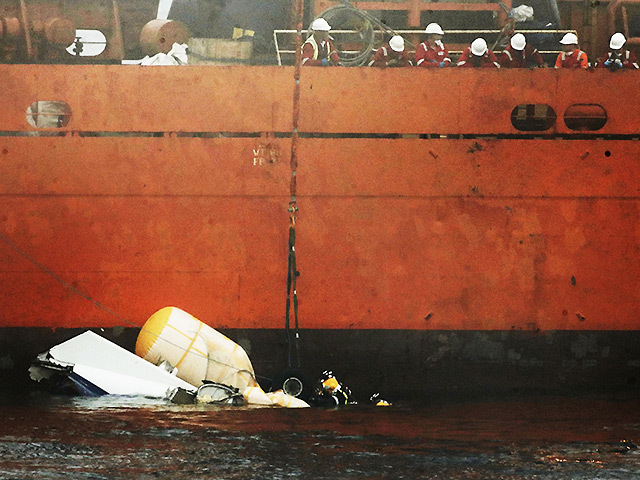
The pilot of the doomed helicopter which crashed into the North Sea off Shetland is being treated in hospital for a broken back.
A major police and air accident investigation is under way into the ditching of the AS332 L2 Super Puma on Friday night.
However, the probe is being hampered by delays in finding the aircraft’s data recorder, which is believed to be on the seabed in the aircraft’s tail section.
And last night it emerged that the pilot remains in a serious condition in hospital.
Four people were killed when the CHC-operated aircraft plunged into the sea two miles from shore – Sarah Darnley, 45, from Elgin, Gary McCrossan, 59, from Inverness, Duncan Munro, 46, from Bishop Auckland, and George Alison, 57, from Winchester.
The body of Miss Darnley was brought back to the mainland yesterday morning after travelling overnight by ferry.
There was a sombre mood at Aberdeen Harbour as the final victim of the crash was taken ashore.
The copter was taking workers from the Borgsten Dolphin platform to Sumburgh Airport.
CHC has grounded all Super Puma helicopters, while fellow operators Bond Offshore and Bristow have also enforced a temporary suspension of non-emergency flights.
A rally will take place in Aberdeen today as oil workers continue to seek assurances about their own safety offshore, and demand answers about what happened to their colleagues.
The National Union of Rail, Maritime and Transport Workers (RMT) will congregate at its Crown Street headquarters at 11am. The group had originally planned to protest at CHC’s Aberdeen base because they were being denied access to visit their members offshore in the wake of the tragedy.
But following discussions with Oil & Gas UK last night, both parties agreed that due to significantly reduced helicopter capacity, such visits would not be feasible.
General secretary Bob Crow said that Oil and Gas UK had met the union’s demand of guaranteed access to offshore workers.
He said: “This means we can speak to our workers and find out what their concerns are and relay them back. It gives them a voice.
“The rally will let people offshore know that we are doing everything possible to try and secure safety for them and their families.”
Last night Duncan Trapp, vice-president of safety for CHC, assured the union – and the public – that safety remains the company’s ultimate priority.
“We understand the concerns and anger among the workforce and we are devastated by Friday’s tragedy,” he said.
“We do not and will not cut corners on safety. It is not in the interests of our passengers, our people or our business.”
The search also continued last night for the helicopter’s black box, which will hold key evidence in establishing what caused the aircraft to suffer a catastrophic loss of power.
The fuselage was recovered on Sunday, but salvage experts are still using specialist sonar equipment to look for the tail section, which contains the black box flight data recorder.
Salvage vessel, the Bibby Polaris, remains at the crash site. Oil industry bosses have admitted they are facing major disruption in the wake of the tragedy, with more than half the industry fleet grounded.
Recommended for you
